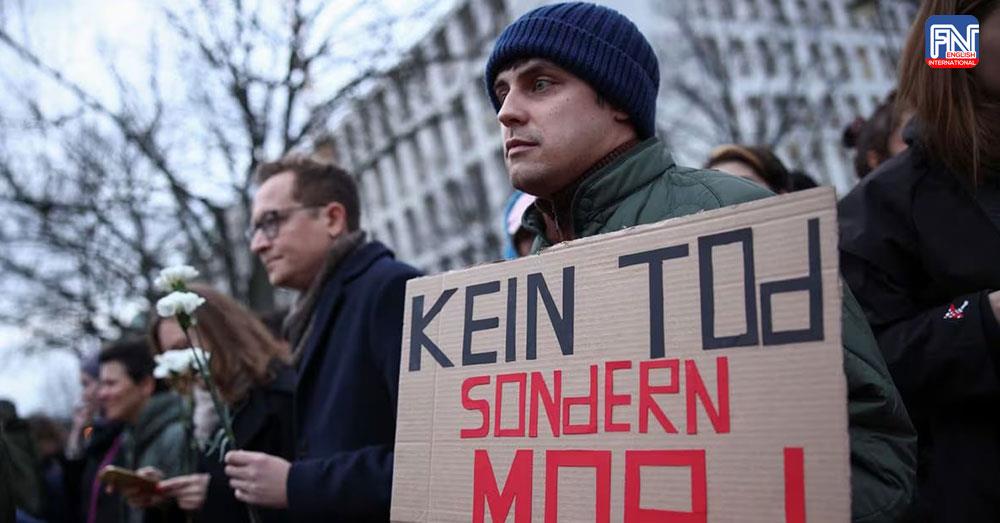BERLIN/VILNIUS, Feb 16 (Reuters) - Hundreds of protesters, many of them Russian emigres, gathered in cities across Europe and beyond on Friday to express their outrage over the death of Kremlin critic Alexei Navalny.
Often gathering outside Russian embassies, they chanted slogans critical of Russian President Vladimir Putin, whom they blamed for the activist's death, holding up signs calling him a "killer" and demanding accountability.
Putin's most formidable domestic opponent, Navalny fell unconscious and died on Friday after a walk at the Arctic penal colony where he was serving a three-decade sentence, prison authorities said.
In Berlin, a crowd of 500 to 600 people, according to police estimates, gathered on the city's Unter den Linden boulevard, chanting in a mixture of Russian, German and English.
Some chanted "Putin to the Hague", referring to the international criminal court investigating possible war crimes committed in Ukraine.
Police used barriers to close off the road between the Russian embassy and the crowd.
"Alexei Navalny is the leader of the Russian opposition and we always kept hope in his name," said a Russian man draped in a blue-and-white anti-war flag, giving his name only as Ilia.
In Lithuania, formerly run from Moscow but now a member of NATO and the European Union and home to a sizeable community of emigres, protesters placed flowers and candles by a portrait of Navalny.
"He was always with us, so it is all surreal," said Lyusya Shtein, 26, a Pussy Riot activist who has lived in Vilnius since leaving Russia in 2022. "None of us yet understand what happened".
In Russia itself, prosecutors warned Russians against participating in any mass protest in Moscow. Police watched as some Russians came to lay roses and carnations at a monument to victims of Soviet repression in the shadow of the former KGB headquarters.
Rights group OVD-Info, which reports on freedom of assembly in Russia, said that more than 100 people had been detained at rallies in memory of Navalny. Reuters could not immediately verify the report.
Groups also gathered in Rome, Amsterdam, Barcelona, Sofia, Geneva and The Hague, among others.
More than 100 protesters stood outside Russia's London embassy, holding placards that called Putin a war criminal, while in Lisbon hundreds held a silent vigil. Pavel Elizarov, a 28-year-old Russian living in Portugal, said Navalny had been "a symbol of freedom and hope."
Near the Russian embassy in Paris, where around 100 protesters gathered, Natalia Morozov said Navalny had also been a symbol of hope for her.
"It's hard for me to express my emotions, because I'm really shaken", said Morozov. "Now we no longer have hope for the beautiful Russia of the future".
Navalny's death, if confirmed, leaves the scattered groups that oppose Putin without a figurehead, and no obvious candidate to marshal any discontent over his demise into mass protests.
Navalny's wife, Yulia, was in Munich on Friday, where a vigil also took place. She told the Munich Security Conference she could not be sure her husband was dead because "Putin and his government... lie incessantly" but said that if confirmed she wanted them to know "they will bear responsibility."
On the other side of the Atlantic, at a vigil outside the Russian consulate in New York City, Violetta Soboleva said she had volunteered for Navalny's presidential campaign in 2017.
"I really believed that he's the one and he can lead Russia to a better future," said Soboleva, a Russian studying for her doctorate in New York. "And now we've lost this future forever."

Photo from Reuters